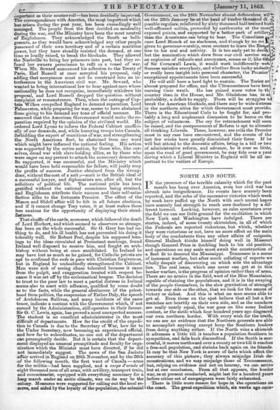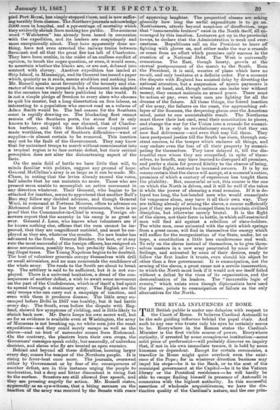NORTH AND SOUTH.
IN the presence of the terrible calamity which for the past month has hung over America, even her civil war has shrunk into insignificance. Its events have scarcely been reported, and the echo of the successive victories which week by week have puffed up the North with such unreal hopes have scarcely had strength to reach ears deafened by a dif- ferent turmoil. Looking, however, as calm spectators over the field we can see little ground for the exultation in which New York and Washington have indulged. There are stories, indeed, of some twenty skirmishes, in all of which the Federals are reported victorious, but which, whether they were victorious or not, have no more effect on the main body of the combatants than any other affairs of outposts. General Halleck thinks himself doing well in Missouri though General Price is doubling back to his old position, and operations on any scale must await the construction of a fleet fit to descend the Mississippi. Tennessee is a scene of incessant warfare, but after much collating of reports we wholly despair of discovering on which side the advantage lies. The real issue, which one never can get at in this border warfare, is the progress of opinion rather than of arms. There are no armies in the field, west of the Blue Mountains, capable of chaining the populations, and it is in the swaying of the people themselves, in the slow gravitation of strength towards one side or the other, that we look for the omens of victory or defeat. And this is what no man seems able to get at. Even those on the spot believe that all but a few wretches are heartily on their own side, and as the numbers are really nearly equal, the war goes on like some Indian contest, or the strife which four hundred years ago disgraced our own northern border. With every wish for the truth, we can see no evidence that the Northern generals are able to accomplish anything except keep the Southern leaders from doing anything either. If the North wins a skirmish it advances a little till it touches a population Southern in sympathies, and falls back discomfited. If the South is suc- cessful, it moves northward over a county or two till it reaches a free-soil population, and shrinks back again on its friends. It may be that New York is aware of facts which affect the accuracy of this picture ; they always misjudge Irish de- monstrations, and we may misjudge those of Tennesseeans, but, relying on evidence and not on hearsay, we can arrive but at one conclusion. From all that appears, the border war, as at present conducted, might last for a hundred years before either set of campaigners were fairly exhausted.
There is little more reason for hope in the operations on the coast. The great expedition which, six weeks ago occu- pied Port Royal, has simply stopped there, sad is now suffer- ing terribly from disease. The Northern journals acknowledge 5000 men in hospital, and a per-centage of mortality which they evidently shrink from making too public. The ominous word " Walcheren" has already been heard in connexion with the expedition, and its leaders are suspiciously and most exceptionally silent. They have apparently done no- thing, have not even arrested the railway trains between Savannah and all that the great fire has left of Charleston. 'They have been unable, in the midst of an endless conflict of opinion, to touch the negro question, or even, it would seem, to ascertain whether the blacks are, or are not, debased into content with slavery. Another expedition has landed at Ship Island, in Mississippi, and its General has issued a paper which, quaintly as it reads, means abolition and nothing less. Mr. Russell speaks most favourably of the honesty and cha- racter of the man who penned it, but a document less adapted to the occasion has rarely been published to the world. It is not a simple pledge of freedom to every slave who chooses to quit his master, but a long dissertation on free labour, as interesting to a population who cannot read as a volume of Adam Smith would be. The bad season for the Southern coast is rapidly drawing on. The blockading fleet cannot remain off the Southern ports, the stone fleet is only known to have stopped up one channel, that of Charles- ton harbour, and with the blockade once impaired or made worthless, the first of Southern difficulties—want of supplies—is almost certain to be removed. This inaction may not be the fault of the Government. They may know that for untrained troops to march without commissariat into a tropical region is to face certain defeat, but their critical perception does not alter the disheartening aspect of the facts.
On the main field of battle we have little that will, to minds familiar with politics, suggest any ground of hope. General McClellan's army is as large as it can be made. Mr. Chase, in noting that the levies already exceed the votes, half admits that he can maintain no more. Those who are present seem unable to accomplish an active movement in any direction whatever. Their General, who begins to be attacked for inaction' seems to apprehend that another Bull's _Run may follow any decided advance, and though General Wool, in command at Fortress Monroe, offers to advance on Richmond alone if he has but reinforcements, there is no proof that the Commander-in-Chief is wrong. Foreign ob- servers report that the anarchy in his camp is as great as ever. General J. Lane, who knows what volunteers are if he knows nothing else, affirms that the men cannot be im- proved, that they are magnificent materiel, and must be em- ployecl as they are, whatever the results. No new leader has advanced to the front. General Bleaker, the best, or at any rate the most successful of the foreign officers, has resigned on some accusations, possibly true, but probably false of levy- ing illegal taxes. The Young Napoleon begins to be doubted. The host of volunteer generals occupy themselves with drill or small skirmishes, and no man commands the confidence of the whole army. The roads to the South are about to break sip. The artillery is said to be sufficient, but it is not em- ployed. There is a universal hesitation, a dread of the con- sequences of another defeat, a wish to await some movement on the part of the Confederates, which is of itself a bad spirit -to spread through a stationary army. The English are the only troops who can carry out a campaign of inaction, and even with them it produces disease. The little army en- camped before Delhi in 1857 was healthy, but it had battle every day. The South, even before the dispute with Eng- land, showed few symptoms of yielding, and is little likely to shrink back now. Mr. Davis keeps his own secret well, but so far as evidence is available even at Washington, the army of Manassas is not breaking up, no white men join the coast expeditions—and they could surely escape as well as the e.laves—and no hint of surrender comes from Richmond. On the contrary, the planters burn their own crops, the Governors' messages speak coldly, but assuredly, of unbroken decision, and slaves who fly are treated as open enemies. Behind and beyond all these difficulties, looming larger every day, comes the temper of the Northern people. It is rising to fever-heat once more. The journals, overawed either by Government or by fear of the consequences of another defeat, are in this instance urging the people to moderation, but a deep and bitter discontent is rising fast to the surface. Senators are still allowed free speech, and they are pressing angrily for action. Mr. Russell states, apparently as an eye-witness, that a biting sarcasm on the inaction of the army was received by the Senate with roars of approving laughter. The propertied classes are asking gloomily how lone the awful expenditure is to go on. Northerners, utterly beyond suspicion of disaffection, urge that "innumerable traitors" exist in the North itself, all en- couraged by this inaction. Lecturers get up in the provincial towns, to declare that the Administration is weak and over- cautious. Republicans call on the President to leave off' fighting with gloves on, and either make the war a crusade or cease from an effort which promises only success in the creation of a National Debt. The West is universally censorious. The East, though hearty, growls at the eternal postponement of the march to the South. Even the President, it is said, wearies of plans which have no result, and only hesitates at a definite order. For a moment the dispute with England has assisted delay by diverting the national attention, but a suspension of specie payments is already at hand, and, though nations can make war without money, they cannot maintain an armed peace. There must be action or pay, even when men are fighting for oil the dreams of the future. All these things, the forced inaction of the army, the failures on the coast, the approaching col- lapse of the finances, the deepening gloom over the American mind, point to one unmistakable result. The Northerns must throw their last card, rend their constitution to pieces, and change the war for the Union into a crusade for emanci- pation. It is only in revolutionary energy that they can now find deliverance—and even that may fail them. They have postponed justice till the South has risen, through con- stant success, to the temper which endures all things, and may endure even the loss of all their property by emanci- pating for themselves. They have delayed it, till the dis- trustful race whom they are compelled, in spite of them- selves, to benefit, may have learned to disregard all promises, and prefer a claim for proved fidelity to the chance of being, after their flight, restored to incensed owners. It is by no means certain that the slaves will accept, at a moment's notice, promises of which a century of experience has taught them the pliability. But, successful or not, this course is the one on which the North is driven, and it will be well if she takes it while the power of choosing a road remains. If it is de- layed too long, the hot-headed men who would emancipate for vengeance alone, may have it all their own way. They are talking already of arming the slaves, a course sufficiently just if they are prepared to compel them to maintain civilized discipline, but otherwise merely brutal. It is the flight of the slaves, not their force in battle, in which self-restrained men will find aid against a rebellion of slave-holders. The white men, once animated with the spirit which springs from a great cause, will find in themselves the energy which will suffice for the reorganization of the State, under, let us hope, a constitution a little less cumbersome and weak. To rely on the slaves instead of themselves, is to give them- selves masters in a new army penetrated by none of their feelings, and animated by none of their desires, ready to follow the first leader it trusts, even should his object be other than a free government. It is emancipation, not the arming of the slaves, a great cause not a servile insurrection, to which the North must look if it would not see itself foiled without a defeat by the vices of its organization, and the demoralization of its leaders. The "inexorable logic of events," which exists even though diplomatists have used the phrase, points to emancipation or failure as the only alternatives for the North.































 Previous page
Previous page